
Aug 4
1859 Birth: Knut Hamsunin Gudbrandsdalen, Norway:
From early childhood he was a shoemaker's apprentice, but was also a road worker, stonemason, junior-level teacher, and so on. He spent some years in America, travelling and working as a tram driver, and published his impressions, chiefly satirical, under the title Fra det moderne Amerikas Aandsliv (1889) [The Intellectual Life of Modern America]. The novel Sult (1890) [Hunger] and even more so Pan (1894) led to Hamsun's literary breakthrough and Sult is regarded as the first genuinely modern novel in Norwegian literature.
Hamsun's work is determined by a deep aversion to civilization and the belief that man's only fulfilment lies with the soil. This primitivism (and its concomitant distrust of all things modern) found its fullest expression in Hamsun's masterpiece Markens Grøde (1917) [Growth of the Soil] . . . . Hamsun's later works focused less on individual characters and more on broad attacks on civilization . . . .
Hamsun's admiration for Germany, which was of long standing, made him sympathetic toward the Nazi invasion of Norway in 1940. After the war he was sentenced to the loss of his property, temporarily put under psychiatric observation, and spent his last years in poverty. A fifteen-volume edition of his complete works was published in 1954, two years after his death.
1879 A law is passed in Germany making Alsace Lorraine a territory of the empire:

Alsace and partly Lorraine became German after the French defeat of 1870. It was only from 1871 when the Treaty of Frankfurt, which stated the split of Lorraine was signed, that the expression Alsace-Lorraine (Imperial Territory of Alsace-Lorraine: Reichsland Elsass-Lothringen) was used. From Lorraine, the Prussians annexed a territory which is nowadays the département of Moselle. The whole territory of what is now the French region of Alsace was annexed too.
On May 10th 1871, the Treaty of Frankfurt confirms the annexation of Alsace-Lorraine by the Prussians, and states that its inhabitants will be allowed to declare that they want to keep their French nationality and leave the region before October 31st 1872. After this date, they would become German. About 159,000 inhabitants of Alsace-Lorraine chose to keep their French nationality. More than 50,000 of them left their friends and their home behind them. But many others remained and protested against their incorporation to the German Empire without their consent.
[One trusts that they complained to their comic-opera Emperor, Louis Napoleon, who had brought this upon them.—Ed. For further details, Click here]
1903 Papal election: Italian cardinal Giuseppe Melchiorre Sarto was elected to become Pope Pius X. [Note: Pius died in August 1914, partly overcome by horror at the impending war.—Ed.]
1912 Birth: Raoul Wallenberg: to one of the most famous families in Sweden:
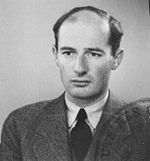
[The large Wallenberg family is] a family that has contributed to Sweden bankers, diplomats and politicians during several generations. Raoul's father, Raoul Oscar Wallenberg, was an officer in the navy, and cousin to Jacob and Marcus Wallenberg, two of Sweden's most famous bankers and industrialists. Raoul was born August 4, 1912, three months after his father's death. His mother, Maj Wising Wallenberg, remarried Fredrik von Dardel in 1918.
Raoul's grandfather, Gustav Wallenberg, took care of Raoul's education. The plan was for him to continue the family tradition and become a banker, but he was more interested in architecture and trade.
In 1930, Raoul Wallenberg graduated with top grades in Russian and drawing. After his army service he traveled to the USA in 1931 to study architecture at the University of Michigan in Ann Arbor. Wallenberg spent a lot of time studying, and he graduated in 3 1/2 years. Most of his classes were held in what is now Lorch Hall. Wallenberg graduated with honors and won a medal that went to the person with the most impressive academic record. Wallenberg's letters reveal that he enjoyed his studies. He wrote to his grandfather, "When I now look back upon the last school year, I find I have had a completely wonderful time." In 1935, he received his bachelor degree of Science in Architecture and returned to Sweden. But the market for architects was small in Sweden, so his grandfather sent him to Cape Town, South Africa, where he practiced at a Swedish firm selling building materials. After six months, his grandfather arranged a new job for him at a Dutch bank office in Haifa, Palestine (now Israel).
It was in Palestine he first met Jews that had escaped Hitler's Germany. Their stories of the Nazi persecutions affected him deeply. Perhaps because he had a very humane attitude to life and because he owned a drop of Jewish blood (Raoul's grandmother's grandfather was a Jew by the name of Benedicks who arrived in Sweden by the end of the 18th century). After his return from Haifa in 1936, Raoul Wallenberg resumed his old interest for business.
Through Jacob Wallenberg's good contacts in the business world, Raoul was eventually brought together with Koloman Lauer, a Hungarian Jew. He was a director of a Swedish based import and export company specializing in food and delicacies.
Thanks to Raoul Wallenberg's excellent language skills, and thanks to his freedom of movement in Europe, he was a perfect business partner for Lauer. Within eight months, Raoul Wallenberg was a joint owner and international director of the Mid-European Trading Company.
Through his trips in Nazi-occupied France and in Germany itself, Raoul quickly learned how the German bureaucracy functioned. He had also made several trips to Hungary and Budapest, where he visited Lauer's family. Hungary was still a relatively safe place in a hostile surrounding.
During the spring of 1944 the world had awoken and realized what Hitler's "final solution to the Jewish problem" meant. In May 1944 the first authentic eye witness report reached the western world of what happened in the extermination camp Auschwitz. It came from two Jews who managed to escape the German gas chambers.
Hitler's plans for the extermination of the Jews of Europe became known. In Hungary, which had joined Germany in the war against the Soviet Union in 1941, there still lived an estimated 700,000 Jews at the beginning of 1944.
When the Germans lost the battle of Stalingrad 1943, Hungary wanted to follow Italy's example and demand a separate peace. Hitler then called the Hungarian head of state, Miklós Horthy, and demanded continued solidarity with Germany. When Horthy refused to meet the demands, Hitler invaded Hungary on March 19, 1944. Soon after that, the deportations of Jews started. The destination was Auschwitz-Birkenau in southern Poland, and a certain death.
The Germans started deporting the Jews from the country side, but the Jewish citizens of Budapest knew that their hour of fate was also soon to come. In their desperation they sought help from the embassies of the neutral countries, where provisional passes were issued for Jews with special connections to these countries.
The Swedish legation in Budapest succeeded in negotiating with the Germans that the bearers of these protective passes would be treated as Swedish citizens and exempt from wearing the yellow Star of David on their chest. It was Per Anger, a young diplomat at the legation in Budapest, who initiated the first of these Swedish protective passes. (In 1982, Per Anger was also awarded the honor of "Righteous among the Nations" by Yad Vashem in Jerusalem for his heroic actions to save Jews during the war.)
In a short period of time the Swedish legation issued 700 passes, a drop in the ocean compared to the enormous number of Jews being threatened. The legation requested immediate staff reinforcements from the foreign department in Stockholm.
In 1944, the USA established The War Refugee Board (WRB), an organization with the purpose of saving Jews from Nazi persecution. The WRB soon realized that serious attempts were being made from the Swedish side to rescue the Jewish population in Hungary. The WRB's representative in Stockholm called a committee with prominent Swedish Jews to discuss suitable persons to lead a mission in Budapest for an extensive rescue operation. Among the participants was Raoul Wallenberg's business partner Koloman Lauer, chosen as an expert on Hungary.
The first choice was Folke Bernadotte, chairman of the Swedish Red Cross and relative to the Swedish king. After Bernadotte was disapproved by the Hungarian government, Koloman Lauer suggested that his business partner Raoul Wallenberg should be asked. Lauer emphasized that Wallenberg had made many trips to Hungary while working for their joint company. Raoul was considered too young and seemed inexperienced, but Lauer was persistent. Raoul was the right man according to him: a quick thinker, energetic, brave and compassionate. And he had a famous name.
Soon everybody had approved Wallenberg. At the end of June 1944 he was appointed first secretary at the Swedish legation in Budapest with the mission to start a rescue operation for the Jews. Raoul was very excited to go to Hungary, but first he wrote a memo to the Swedish foreign department. He was determined not to get caught in the protocol and paperwork bureaucracy of diplomacy. He demanded full authorization to deal with whom he wanted without having to contact the ambassador first. He also wanted to have the right to send diplomatic couriers beyond the usual channels.
The memo was so unusual that it was sent all the way to Prime Minister Per Albin Hansson, who consulted the king before he announced that the demands had been approved.
By the time Raoul Wallenberg arrived in Budapest in July 1944, the Germans under the leadership of Adolf Eichmann had already sent away more than 400,000 Jewish men, women and children. They had been deported on 148 freight trains between the May 14 and July 8. When Wallenberg came to Budapest, only about 230,000 Jews were left.
The German SS officer Adolf Eichmann was now preparing a plan that in one day would exterminate the whole Jewish population in Budapest. In a report to Berlin he said that "the technical details will take a few days."
If this plan had been but into action Raoul Wallenberg's mission would have been meaningless. Then the "Jewish issue" would have been "permanently solved" for that part of Hungary. The head of state, Miklós Horthy, meanwhile received a letter from the Swedish King, Gustav V, with an appeal that the deportations should stop. Horthy sent a note to the Swedish king saying he "did everything in his power to ensure that the principals of humanity and justice would be respected." The Germans deportations were canceled and one train with 1,600 Jews was stopped at the border and sent back to Budapest.
Oddly enough the German authorities approved the cancellation of the deportations. The explanation may have been that Heinrich Himmler, one of the top Nazi officials during this time, played a high level game for peace. He thought he could negotiate a separate peace with the western allies and might have thought he'd stand a better chance if the pressure on the Jews was decreased. Adolf Eichmann could do nothing but wait.
At this time minister Carl Ivar Danielsson was head of the Swedish legation. His closest aide was secretary Per Anger. Raoul Wallenberg now headed the department responsible for helping the Jews. Before Wallenberg arrived the head of the Red Cross in Hungary, Valdemar Langlet, helped the Swedish legation. Langlet rented buildings for the Red Cross and put signs like "The Swedish Library" and "The Swedish Research Institute" on its doors. These buildings were then used as hiding places for Jews.
Raoul Wallenberg did not use traditional diplomacy. He more or less shocked the diplomats at the Swedish legation with his unconventional methods. Everything from bribes to extortion threats were used with success. But when the rest of the staff of the legation saw Wallenberg's results, he quickly got their unreserved support.
Raoul Wallenberg's first task was to design a Swedish protective pass to help the Jews against the Germans and Hungarians. He had previous experience that both the German and Hungarian authorities were weak for flashy symbols. He therefore had the passes printed in yellow and blue with the coat of arms of the Three Crowns of Sweden in the middle, and added the appropriate stamps and signatures on it. Of course Wallenberg's protective passes had no value whatsoever according to international laws, but it provoked respect. To begin with Wallenberg only had permission to issue 1,500 passes. Quickly, though, he managed to negotiate another 1,000, and through promises and empty threats to the Hungarian foreign ministry he eventually managed to raise the quota to 4,500 protective passes.
In reality Wallenberg managed to issue more than three times as many protective passes. He controlled a staff of several hundred co-workers. They were all Jews and thanks to their work with Wallenberg they didn't have to wear the degrading yellow star.
In August 1944, the Hungarian head of state, Horthy, fired his pro-German Prime Minister Sztójay and let General Lakatos succeed him. The situation for the Jews improved considerably. Through diplomatic pressure, mediated and emphasized by Raoul Wallenberg, the responsibility to "solve the Jewish issue in Hungary" was taken away from Adolf Eichmann.
Now Wallenberg thought his department at the legation could be dismantled and that he himself could return back to Sweden. He expected the invading and winning troops of the Soviet Union to soon take over Budapest.
On October 15, the head of state, Miklós Horthy, declared that he wanted peace with the Soviets. But his radio speech had barely been broadcast when the German troops took command. Horthy was overthrown immediately and replaced by the leader of the Hungarian Nazis, Ferenc Szálasi. He was the leader of the Arrow Cross organization, who was just as feared as the German Nazis for their cruel methods against the Jewish population. Adolf Eichmann returned and received a free hand to continue the terror against the Jews.
Raoul Wallenberg kept on fighting in spite of the ruling powers of evil and appeared often as an unwelcome witness to the atrocities. In many cases he managed to save Jews from the clutches of the Nazis with his firm action and courage as his only weapon.
Now Raoul started to build his "Swedish houses." It was some 30 houses in the Pest part of the city where the Jews could seek refuge. A Swedish flag hung in front of the door and Wallenberg declared the house Swedish territory. The population of the "Swedish houses" soon rose to 15,000.
The other neutral legations in Budapest started to follow Wallenberg's example and issued protective passes. A number of diplomats from other countries were inspired to open their own "protective houses" for Jewish refugees.
Toward the end of the war, when the situation became increasingly desperate, Wallenberg issued a simplified form of his protective pass, one copied page with his signature alone. In the existing chaos even that worked.
The newly instated Hungarian Nazi government immediately let it be known that with the change of power the protective passes were no longer valid. Meanwhile, Wallenberg befriended the Baroness Elizabeth "Liesel" Kemény. She was the wife of the foreign minister, and with her cooperation the passes were made valid again.
During this time Eichmann started his brutal "death marches." He went through with his promised deportation plan by having large numbers of Jews leave Hungary by foot. The first march started November 20, 1944, and the conditions along the 200 kilometer long road between Budapest and the Austrian border were so horrendous that even the Nazis themselves complained.
The marching Jews could be counted in the thousands along never-ending rows of starving and tortured people. Raoul Wallenberg was in place all the time to hand out protective passes, food and medicine. He threatened and he bribed until he managed to free those with Swedish passes.
When Eichmann's killers transported the Jews in full trains, Wallenberg intensified his rescue efforts. He even climbed the train wagons, stood on the tracks, ran along the wagon roofs, and stuck bunches of protective passes down to the people inside. The German soldiers were ordered to open fire, but were so impressed by Wallenberg's courage that they deliberately aimed too high. Wallenberg could jump down unharmed and demand that the Jews with passes should leave the train together with him.
Raoul Wallenberg's department at the Swedish legation grew constantly and finally kept 340 persons busy. Another 700 people also lived in their building.
Toward the end of 1944, Wallenberg moved over the river Danube from Buda to Pest where the two Jewish ghettos were situated. The minimal level of law and order that once existed was now gone. The Arrow Cross, police and German war machine shared power.
Wallenberg searched desperately for suitable people to bribe, and found a very powerful ally in Pa'l Szalay, a high-ranking officer in the police force and an Arrow Cross member. (After the war, Szalay was the only Arrow Cross member that wasn't executed. He was set free in recognition for his cooperation with Wallenberg.)
The second week of January 1945 Raoul Wallenberg found out that Eichmann planned a total massacre in the largest ghetto. The only one who could stop it was general August Schmidthuber who was commander-in-chief for the German troops in Hungary.
Wallenberg's ally Szalay was sent to deliver a note to Schmidthuber explaining that Raoul Wallenberg would make sure that the general would be held personally responsible for the massacre and that he would be hanged as a war criminal after the war. The massacre was stopped at the last minute thanks to Wallenberg's action.
Two days later, the Russians arrived and found 97,000 Jews alive in Budapest's two Jewish ghettos. In total 120,000 Jews survived the Nazi extermination in Hungary.
According to Per Anger, Wallenberg's friend and colleague, Wallenberg must be honored with saving at least 100,000 Jews.
On January 13, 1945, an advancing Soviet troop saw a man standing and waiting for them in front of a house with a large Swedish flag above the door. In fluent Russian, Raoul Wallenberg explained to a surprised Russian sergeant that he was Swedish chargé d'affaires for the Russian-liberated parts of Hungary. Wallenberg requested, and was given permission to visit the Soviet military headquarters in the city of Debrecen east of Budapest.
On his way out of the capital on January 17, with Russian escort, Wallenberg and his driver stopped at the "Swedish houses" to say good-bye to his friends. To one of his colleagues, Dr. Ernö Petö, Wallenberg said that he wasn't sure if he was going to be the Russian's guest or their prisoner. Raoul Wallenberg thought he'd be back within eight days—but he has been missing since then.
Whether Raoul Wallenberg is alive or not is uncertain. The Russians claim that he died in Russian captivity on July 17, 1947. A number of testimonies indicate, however, that he was alive and that he still could be alive.
Before we elaborate on Raoul Wallenberg's captivity in the Soviet Union we have to straighten two things out. First, why did he want contact with the Russians in Debrecen? Secondly, why did the Russians arrest him?
In November 1944, Wallenberg had established a section in his department that under his supervision would make a detailed financial support plan for the surviving Jews. The Russians did not have the same views of Jews and, therefore, presumably couldn't understand that a person had devoted his soul to save them. Therefore it was important to Wallenberg to explain his rescue operation.
The Russians probably believed that Wallenberg had another reason for his rescue efforts. They probably suspected him of being an American spy and were almost certainly skeptical of Wallenberg's contact with the Germans.
Raoul Wallenberg and his driver Vilmos Langfelder never returned from Debrecen. According to reliable testimonies they were arrested and sent to Moscow. They were arrested by NKVD, an organization that later changed its name to KGB. Wallenberg and Langfelder were placed in separate cells in the Lubjanka prison according to eye witnesses.
Wallenberg wasn't the only diplomat in Budapest that aroused Soviet suspicion. The Swiss legation had also run extensive rescue operations for the Hungarian Jewish population. The Russians arrested a secretary of their legation together with a clerk and sent them to the Soviet Union. The Swiss succeeded, however, in getting them extradited with Soviet citizens detained in Switzerland.
It would take some time before authorities in Stockholm became concerned about Raoul Wallenberg's disappearance. In a letter to the Swedish ambassador in Moscow, the Russian Vice Foreign Minister Dekanosov declared that "the Russian military authorities had taken measures and steps to protect Wallenberg and his belongings."
The Swedes, of course, expected Raoul Wallenberg to come home soon. When nothing happened, Raoul's mother, Maj von Dardel, contacted the Russian ambassador in Stockholm, Aleksandra Kollontaj, who explained that she could be calm, since her son was well kept in Russia. To the Swedish Foreign Minister Christian Günther's wife, Aleksandra Kollontaj said at the same time that it would be best for Wallenberg if the Swedish government wouldn't stir things up.
On March 8, 1945, the Soviet-controlled Hungarian radio announced that Raoul Wallenberg had been murdered on his way to Debrecen, probably by Hungarian Nazis or Gestapo agents. This created a certain passiveness with the Swedish government. Foreign Minister Östen Undén and Sweden's ambassador in the Soviet Union presumed that Wallenberg was dead. In most places, however, the radio message wasn't taken seriously.
Many people have drawn the conclusion that Sweden had an opportunity to negotiate for Wallenberg's release after the war, but that the Swedish side missed the chance.
From 1965 there is a speech from Sweden's Prime Minister at the time, Tage Erlander, which is included in a collection of documents regarding the research around Raoul Wallenberg. Erlander concluded that all efforts that had been taken shortly after the war were without results. In fact, the Soviet authorities had even denied knowledge of Wallenberg. Between 1947 and 1951 nothing new occurred. But when foreign prisoners started to be released from Russian jails many testimonies came regarding Raoul Wallenberg's fate after January 1945.
In April 1956, Prime Minister Tage Erlander traveled with Domestic Minister Gunnar Hedlund to Moscow where they met the Soviet representatives Nikita Khrushchev, Nikolai Bulganin and Vyacheslav Molotov. These men promised to re-investigate what had happened to Raoul Wallenberg.
On February 6, 1957, the Russians announced that they had made extensive investigations and found a document most likely regarding Raoul Wallenberg. In the hand-written document it was stated that "the for you familiar prisoner Wallenberg passed away this night in his cell." The document was dated July 17, 1947, and signed Smoltsov, head of the Lubjanka prison infirmary. The document was addressed to Viktor Abakumov, the minister for state security in the Soviet Union.
The Russians expressed regret in their letter to the Swedes that Smoltsov died in May 1953 and that Abakumov had been executed in connection with cleansing within the security police. The Swedes were very distrustful toward this declaration, but the Russians have to this day stuck to the same statement.
Testimonies from different prisoners who had been in Russian jails after January 1945 tell, in contradiction to the Russian information, that Raoul Wallenberg was imprisoned throughout the 1950's.
In 1965, the Swedish government published a new official report on the Wallenberg case. An earlier white book had been released in 1957. According to the new report, Erlander had done everything in his power to find out the truth about Raoul Wallenberg.
Now the Wallenberg case went into a phase when nothing much happened. The stream of war prisoners from the Soviet Union decreased, and the testimonies were few. At the end of the 70's, the case was brought up again. According to the Swedish foreign department, two very interesting testimonies were the basis for a note to Moscow requesting the case to be reexamined. The answer from the Kremlin was the same as earlier: Raoul Wallenberg died in 1947. On the grounds of additional material considered reliable, Foreign Minister Ola Ullsten sent another request in the beginning of the 80's regarding Raoul Wallenberg to the Russian chief of government Aleksei Kosygin. The reply was the same as usual: Raoul Wallenberg died in 1947.
During the 1980's, interest in Wallenberg grew around the world. In 1981, he became an honorary citizen of the United States, in 1985 in Canada, and in 1986 in Israel. All over the world, many people think he's still alive and demand that he be released from his Russian captivity. In Sweden and other countries—mainly the USA—Raoul Wallenberg associations work endlessly to find answers to what happened Raoul Wallenberg.
In November 2000, Alexander Yakovlev, the head of a presidential commission investigating Wallenberg's fate, announced that the diplomat had been executed in 1947 in the KGB's Lubyanka Prison in Moscow. He said Vladimir Kryuchkov, the former Soviet secret police chief, told him of the shooting in a private conversation. The Russians released another statement in December admitting that Wallenberg was wrongfully arrested on espionage charges in 1945 and held in a Soviet prison for 2½ years until he died. The statement did not explain why Wallenberg was killed or why the government lied about his death for 55 years, claiming from 1957 to 1991 that he died of a heart attack while under Soviet protection (Washington Post December 23, 2000).
On January 12, 2001, a joint Russian-Swedish panel released a report that did not reach any conclusion as to Wallenberg's fate. The Russians reverted to the claim that he died of a heart attack in prison in 1947, while the Swede's said they were not sure if Wallenberg was dead or alive. The report did unearth evidence that the reason the Soviets arrested Wallenberg was the suspicion that he was a spy for the United States (Washington Post January 12, 2001).(jewishvirtuallibrary.org)
1914 World War I: Various:
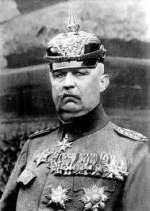
Germany invades Belgium: A specially trained task force of about 30,000 men crosses the frontier and attacks Liege, one of the strongest fortresses in Europe. Some of the fortifications are captured in a daring night attack led by General Erich Ludendorff. The First World War (World War I) begins. For the Belgian King's Address to Parliament (click here)
When London's ultimatum to Berlin to withdraw expires at midnight, Britain declares war on Germany for violating the Treaty of London. For the UK Daily Mirror Report on News of War (click here).
Official Report of the Breaking of Diplomatic Relations and of the "Scrap of Paper" by Sir Edward Goschen, British Ambassador to Berlin:
In a short conversation which ensued Herr von Jagow expressed his poignant regret at the crumbling of his entire policy and that of the Chancellor, which had been to make friends with Great Britain, and then, through Great Britain, to get closer to France.
I said that this sudden end to my work in Berlin was to me also a matter of deep regret and disappointment, but that he must understand that under the circumstances and in view of our engagements, His Majesty's Government could not possibly have acted otherwise than they had done.
For the French Prime Minister's Statement on War (click here).
President Poincaré's War Address:
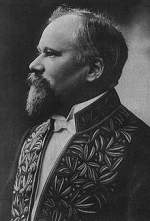
France has just been the object of a violent and premeditated attack, which is an insolent defiance of the law of nations. Before any declaration of war had been sent to us, even before the German Ambassador had asked for his passports, our territory has been violated. The German Empire has waited till yesterday evening to give at this late stage the true name to a state of things which it had already created.
U.S. proclaims neutrality in World War I:

As World War I erupts in Europe, President Woodrow Wilson formally proclaims the neutrality of the United States, a position that a vast majority of Americans favored, on August 4, 1914.
Wilson's initial hope that America could be "impartial in thought as well as in action" was soon compromised by Germany's attempted quarantine of the British Isles. Britain was one of America's closest trading partners, and tension arose between the United States and Germany when several U.S. ships traveling to Britain were damaged or sunk by German mines.
In February 1915, Germany announced unrestricted warfare against all ships, neutral or otherwise, that entered the war zone around Britain. One month later, Germany announced that a German cruiser had sunk the William P. Frye, a private American vessel that was transporting grain to England when it disappeared. President Wilson was outraged, but the German government apologized and called the attack an unfortunate mistake.
In early May 1915, several New York newspapers published a warning by the German embassy in Washington that Americans traveling on British or Allied ships in war zones did so at their own risk. The announcement was placed on the same page as an advertisement for the imminent sailing of the British-owned Lusitania ocean liner from New York to Liverpool. On May 7, the Lusitania was torpedoed without warning by a German submarine just off the coast of Ireland. Of the nearly 2,000 passengers, 1,201 were killed, including 128 Americans.
It was revealed that the Lusitania was carrying about 173 tons of war munitions for Britain, which the Germans cited as further justification for the attack. The United States eventually sent three notes to Berlin protesting the action, and Germany apologized and pledged to end unrestricted submarine warfare. In November, however, a U-boat sunk an Italian liner without warning, killing 272 people, including 27 Americans. Public opinion in the United States began to turn irrevocably against Germany.
In late March, Germany sunk four more U.S. merchant ships, and on April 2, President Wilson appeared before Congress and called for a declaration of war against Germany. On April 4, the Senate voted 82 to six to declare war against Germany. Two days later, the House of Representatives endorsed the declaration by a vote of 373 to 50, and America formally entered World War I.
On June 26, the first 14,000 U.S. infantry troops landed in France to begin training for combat. After four years of bloody stalemate along the Western Front, the entrance of America's well-supplied forces into the conflict was a major turning point in the war. By the time the war finally ended on November 11, 1918, more than 2 million American soldiers had served on the battlefields of Western Europe, and some 50,000 of these men had lost their lives.(History.com)
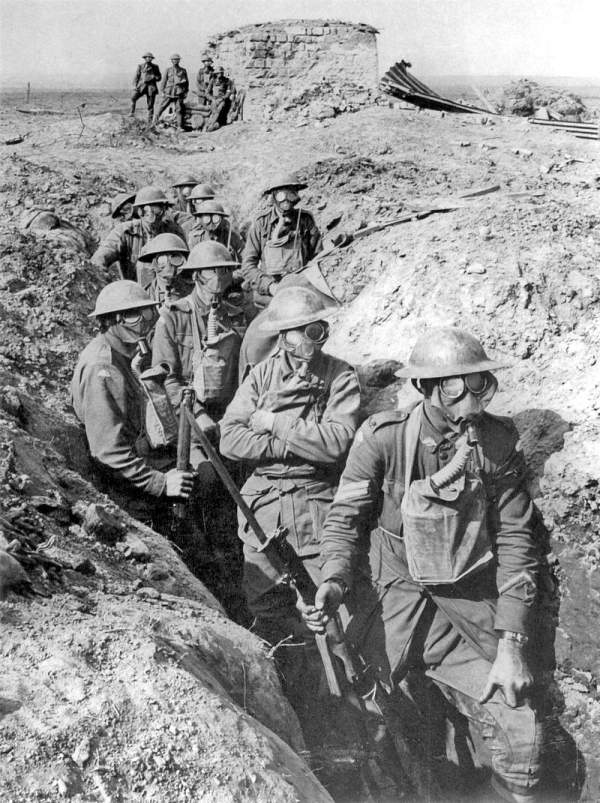
1915 World War I:List Regiment: Gefreiter Adolf Hitler's 16 Reserve Infantry Regiment continue to occupy a position, at Fromelles. [For further details, Click here.]
Alois Schnelldorfer writes to his parents back home: "I keep waiting with baited breath to see when we shall start to fight and enforce peace. I don't believe that the Englishmen would give up so easily without actually being beaten ... but then they won't have anything to laugh about, because everyone here has a fanatical hatred of the enemy. . . . one should never take prisoners; they should all be killed." From Adolf Hitler's Mein Kampf: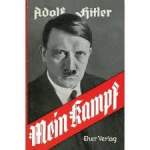
In the summer of 1915 the first enemy leaflets were dropped on our trenches. They all told more or less the same story, with some variations in the form of it. The story was that distress was steadily on the increase in Germany; that the War would last indefinitely; that the prospect of victory for us was becoming fainter day after day; that the people at home were yearning for peace, but that 'Militarism' and the 'Kaiser' would not permit it; that the world—which knew this very well—was not waging war against the German people but only against the man who was exclusively responsible, the Kaiser; that until this enemy of world-peace was removed there could be no end to the conflict; but that when the War was over the liberal and democratic nations would receive the Germans as colleagues in the League for World Peace. This would be done the moment 'Prussian Militarism' had been finally destroyed.
To illustrate and substantiate all these statements, the leaflets very often contained "Letters from Home", the contents of which appeared to confirm the enemy's propagandist message.
Generally speaking, we only laughed at all these efforts. The leaflets were read, sent to base headquarters, then forgotten until a favorable wind once again blew a fresh contingent into the trenches. These were mostly dropped from airplanes which were used specially for that purpose.
One feature of this propaganda was very striking. It was that in sections where Bavarian troops were stationed every effort was made by the enemy propagandists to stir up feeling against the Prussians, assuring the soldiers that Prussia and Prussia alone was the guilty party who was responsible for bringing on and continuing the War, and that there was no hostility whatsoever towards the Bavarians; but that there could be no possibility of coming to their assistance so long as they continued to serve Prussian interests and helped to pull the Prussian chestnuts out of the fire.
This persistent propaganda began to have a real influence on our soldiers in 1915. The feeling against Prussia grew quite noticeable among the Bavarian troops, but those in authority did nothing to counteract it. This was something more than a mere crime of omission; for sooner or later not only the Prussians were bound to have to atone severely for it but the whole German nation and consequently the Bavarians themselves also.
In this direction the enemy propaganda began to achieve undoubted success from 1916 onwards.
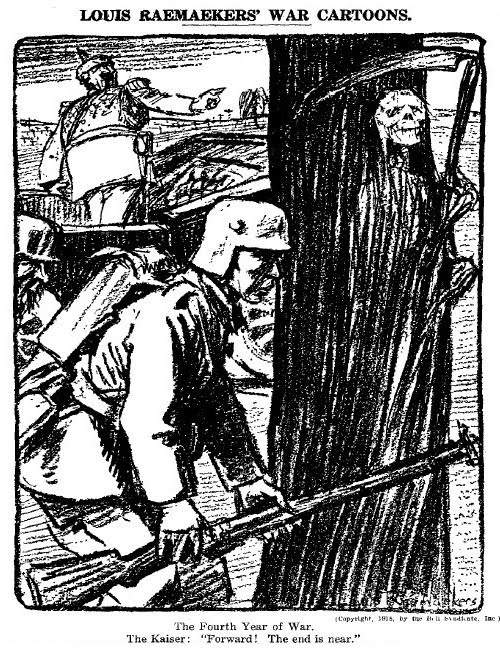
1916 World War I: Various:
List Regiment: Gefreiter Adolf Hitler endures trench warfare in Flanders (Artois) with 3 Company, 16 Reserve Infantry Regiment. [For further details, Click here.]
American Imperialism: Denmark agrees to cede the Danish West Indies including the Virgin Islands:
Construction of the Panama Canal and the rise of German naval strength induced the U.S. government to consider the islands' importance again. Word was conveyed to the Danes that if Germany gave any indication of activity in the Caribbean, the U.S. would immediately seize the Danish West Indies. That warning no doubt put the Danes into a bargaining mood and led to the negotiation of an acquisition treaty in August 1916. The Senate ratified the agreement the following year and authorized the payment of $25 million for the new possessions.
1917 World War I: Various:
List Regiment (July 22-August 3): Dispatch Runner Gefreiter Adolf Hitler serves at the front with 3 Company, 16 Bavarian Reserve Infantry Regiment during Phase 2 operations in Flanders. Most of their time in the trenches gas masks are worn, while English bombers and tanks—a new terror witnessed for the very first time by most—attempt to advance over a long front through seas of mud. [For further details, Click here.]
King Alexander's Address to the Greek Parliament:
It is with sincere joy that I address this first greeting to the representatives of the nation. You know the events which brought about some months ago the division of the Hellenic State, but the benevolent solitude of the protecting powers of Greece succeeded, without sacrifices or an internal struggle, in reconstituting the national unity by the reestablishment of liberal institutions.
The conditions upon which the transmission of the royal power was effected have clearly shown the path to be followed in the future. They render necessary the appeal to the national sovereignty, so as to revise and consolidate at the same time as the throne a form of government established on the basis demanded by the popular will, to decide in the most precise fashion the extent of the sovereign rights of the people as well as the extent of the royal authority as defined by the Constitution, by giving it the democratic character which is the desire of the dynasty.
1918 World War I: Various:
Erich Ludendorff's Official Statement during the Second Battle of the Marne:
Foch's plan was undoubtedly to cut off the entire arc of our front south of the Aisne by a breakthrough on the flank. But with the proved leadership of our Seventh and Ninth Armies that was quite impossible. We figured with an attack on July 18th and were prepared for it. The enemy experienced very heavy losses, and the Americans and African auxiliary troops, which we do not underestimate, suffered severely. By the afternoon of the 19th we already were fully masters of the situation and shall remain so. We left the abandoned ground to the enemy according to our regular plan. "Gain of ground" and "Marne" are only catchwords without importance for the issue of the war. We are now, as before, confident.
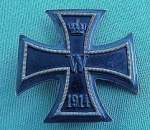
List Regiment (July 20-August 4): Gefreiter Adolf Hitler is awarded the Iron Cross, 1st Class. The citation, dated July 31, 1918, is signed by Baron von Godin, the new regimental commander, and reads as follows:
As a dispatch runner, he has shown cold-blooded courage and exemplary boldness both in positional warfare and in the war of movement, and he has always volunteered to carry messages in the most difficult situations and at risk of his life. Under conditions of great peril, when all the communications lines were cut, the untiring and fearless activity of Hitler made it possible for important messages to go through. Hitler received the Iron Cross Second Class for gallant conduct during fighting at Wytschaete on 1 Dec 1914. [He] fully deserves to be awarded the Iron Cross First Class.
By the summer of 1918, 51,000 German officers had been awarded the Iron Cross First Class, 17,000 NCOs, but only a mere 472 went to ordinary soldiers. [For further details, Click here.] [See: Was Adolf Hitler a 'War Hero' in World War I?]1919 Hungary: Romanian troops occupy Budapest, contrary to the wishes of the government, and after two weeks of fighting, defeat Bela Kun's Hungarian Communists.
1936 Olympics: Jesse Owens wins long jump—and respect—in Germany:

On this day in 1936, American Jesse Owens wins gold in the long jump at the Summer Olympics in Berlin, Germany. It was the second of four gold medals Owens won in Berlin, as he firmly dispelled German Fuehrer Adolf Hitler’s notion of the superiority of an Aryan "master race," for all the world to see.
Jesse Owens first made his mark on the international stage at just 21 years old on May 25, 1935, while an undergrad at Ohio State University, by setting three world records and tying another at the Big Ten Championships in Ann Arbor, Michigan. "The Buckeye Bullet" started his afternoon by running the 100-meter dash in just 9.4 seconds to tie the world record. Just 10 minutes later, Owens jumped 26’8 1/4", setting a world record he would hold until 1951. And, ten minutes after that, Owens set another world record in the 220-yard dash with a time of 20.3 seconds. Finally, less than an hour after his afternoon of competition started, Owens ran the 220-yard hurdles in 22.6 seconds for his third outright world record of the day. Owens’ impressive performance caused a sensation across the United States, and the track world looked forward to following his progress at the upcoming 1936 Olympics.
Owens was openly derided by Nazi officials prior to his arrival in Berlin; some went so far as to call him and his fellow black athletes "non-humans." Owens responded on August 3, when he edged out African-American Ralph Metcalfe to win the 100 meters in an impressive10.3 seconds, a time that would have set the world record if had not been deemed "wind-aided." The next day, August 4, at the Reich Sports Field Stadium, 110,000 spectators watched Owens slam the door on Hitler’s racist theories. In the morning, after fouling on his first two qualifying jumps, Owens finally leaped his way into the final, where he met the young German Lutz Long. Long tied the heavily favored Owens on his second jump, but Owens answered the challenge with a mark of 26’ 5 ½", the first jump over 26 feet in Olympic history, and an Olympic record that would stand for 24 years. As Owens and Lutz walked arm in arm around the track, the German crowd roared its approval. Hitler promptly left the stadium, missing the medal ceremony.
Owens would win his third gold medal and set his second Olympic record of the games in the 200 meters the next day. On August 9, he followed that up by helping his team set a new world record—39.8 seconds—in the 4 x 100 meter relay. Owens and Metcalfe replaced two American Jews, Marty Glickman and Sam Stoller, originally scheduled to run the relay that day. Later, the U.S. team was criticized for the move, which was thought to be an appeasement of Hitler and the Nazi party, who would likely have been even angrier to see Jews, already a frequent target of Nazi hate and harassment, bring home a medal. (History.com)
1939 Countdown to World War II:
German Ambassador in the Soviet Union (Schulenburg) to the German Foreign Office:
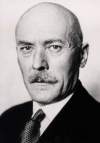
"On the Polish question I stated that we persevered in our well-known demands on Poland but strove for a peaceful solution. If on the other hand a different solution were forced on us, we were prepared to protect all Soviet interests and come to an understanding with the Soviet Government on this matter."

Danzig: The Polish government sends an ultimatum to the Danzig Senate warning it will arm its customs officers if the Senate does not stop interfering with Polish customs inspectors. Supposedly based on mistaken information, Poland's action causes great consternation among the Nazis.
"Hitler was determined to overturn the military and territorial provisions of the Versailles treaty and include ethnic Germans in the Reich. In preparation for war with Poland, in the spring of 1939 Hitler demanded the annexation of the Free City of Danzig to Germany and extraterritorial rail access for Germany across the 'Polish Corridor,' the Polish frontier to East Prussia."
1940 World War II: Unification of Somaliland:
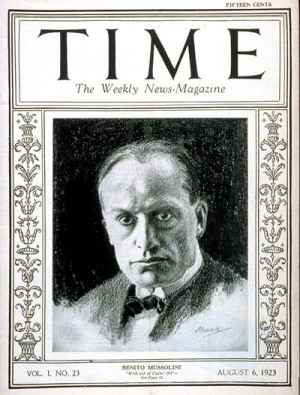
After Italian premier Benito Mussolini's armies marched into Ethiopia and toppled Emperor Haile Selassie, the Italians seized British Somaliland. During their occupation (1940-41), the Italians re-amalgamated the Ogaden with southern and northern Somalilands, uniting for the first time in forty years all the Somali clans that had been arbitrarily separated by the Anglo-Italo-Ethiopian boundaries. The elimination of these artificial boundaries and the unification of the Somali Peninsula enabled the Italians to set prices and impose taxes and to issue a common currency for the entire area. These actions helped move the Somali economy from traditional exchange in kind to a monetarized system.Thousands of Italians, either veterans of the Ethiopian conquest or new emigrants, poured into Somalia, especially into the interriverine region. Although colonization was designed to entrench the white conquerors, many Somalis did not fare badly under Italian rule during this period. Some … accumulated considerable fortunes. One indicator of the Somali sense of relative wellbeing may have been the absence of any major anti-Italian revolt during Italy's occupation. At the onset of World War II, Italian holdings in East Africa included southern Somalia, Ethiopia, and Eritrea. Italy subsequently invaded northern Somalia and ejected the British from the Horn of Africa. The Italian victory turned out to be short-lived, however. In March 1941, the British counterattacked and reoccupied northern Somalia, from which they launched their lightning campaign to retake the whole region from Italy and restore Emperor Haile Selassie to his throne. The British then placed southern Somalia and the Ogaden under a military administration.
1941 World War II: Various:
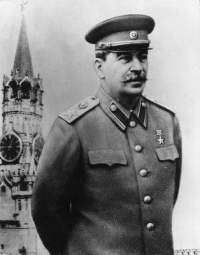
Stalin to FDR:
The USSR attaches great importance to the matter of neutralizing Finland and her association from Germany. The severance of relations between Britain and Finland and the blockade of Finland, announced by Britain, have already borne fruit and engendered conflicts among the ruling circles of Finland. If the US Government were to threaten Finland with a rupture of relations, the Finnish Government would be more resolute in the matter of breaking with Germany. In that case the Soviet Government could make certain territorial concessions to Finland with a view to assuaging her and conclude a new peace treaty with her.

Barbarossa: Hitler visits the headquarters of von Bock's Army Group Center to assess the situation on the eastern front personally. Against the advice of his generals, Hitler decides to postpone the assault on Moscow and concentrate the German forces for a massive offensive in the Ukraine. Almost daily, von Bock receives orders transferring unit after unit south for the drive on Kiev. (THP)
[See: Was Adolf Hitler a 'Great' Military Leader?]1942 World War II: Various:
Barbarossa: Advance units of 4th Panzerarmee cross the Aksai river in their drive toward Stalingrad. [For further details, Click here]

India: The British government charges that Mahatma Gandhi and his All-Indian Congress Party favor 'appeasement' with Japan.
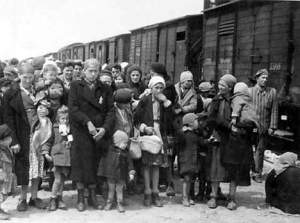
Holocaust: The first deportations of Jews from Belgium begins. During the next two years, a total of 26 trainloads will make their way to Auschwitz. Of 25,631 deported, only 1,244 will survive the war. (THP)
1944 World War II: Various:
The Warsaw Uprising: Warsaw insurgents appeal for Allied help: Churchill sends first air drop from Italy, but Stalin refuses aid. Five of the thirteen British planes fail to return and half the 24 containers fall into German hands. Although the Polish attack was planned to displace the German troops stationed in the city, it was only ever planned to hold the town for several days until the Russians arrived with support. Upon hearing the news of the Uprising, Himmler was so furious that he decreed that the whole city and its population should be destroyed as an example to the rest of Europe. Meanwhile, far from coming to the rescue of the doomed Poles, Stalin halted the Russian advance, claiming that the resistance was illegal and the AK were 'fascists'. The mighty Red Army did little more than watch the struggle.
Churchill to Stalin:
"At urgent request of Polish Underground we are developing, subject to weather, about sixty tons of equipment and ammunition into the southwest quarter of Warsaw, where it is said a Polish revolt against the Germans is in fierce struggle. They also say that they appeal for Russian aid, which seems to be very near. They are being attacked by one and a half German divisions. This may be of help to your operation."
Holocaust: Anne Frank and her family arrested by Gestapo:

On this day in 1944, a German-born Jewish girl and her family, who had been hiding in German-occupied Holland, are found by the Gestapo and transported to various concentration camps. The young girl's diary of her time in hiding was found after her death and published. The Diary of Anne Frank remains one of the most moving testimonies to the invincibility of the human spirit in the face of inhuman cruelty.
She was born Annelies Marie Frank, in Frankfurt am Main, Germany, on June 12, 1929. Her father, Otto Frank, a businessman, moved his wife and two daughters to Holland early in the Hitler regime. After the German invasion and occupation of the Netherlands, the Franks were threatened with deportation to a forced-labor camp and so went into hiding. They spend the next two years, from July 9, 1942, until August 4, 1944, in the back of Otto's food products warehouse, along with four other Jews. Gentile friends and neighbors smuggled in food and other supplies.
Acting on a tip from Dutch informers, the Gestapo (the Nazi secret police), discovered the Franks and arrested them. They then transported them to the Auschwitz concentration camps in Poland in September. Anne and her sister, Margot, were transferred to the Bergen-Belsen concentration camp in northern Germany a month later. There Anne died of typhus, in March 1945, not long before the camp was liberated by the Allies.
Otto Frank was found, still alive, in Auschwitz by the Russian troops that liberated the camps there (Anne's mother had died in January). Friends back in Holland who had searched the Franks' former hiding place found a stash of personal papers; among the collection was Anne's diary, which described her emotional and intellectual development during the two years spent eluding detection by the Nazis. Otto had it published in 1947 as The Diary of a Young Girl. It has since been translated into more than 50 languages and adapted for stage and screen. The most memorable line remains: "In spite of everything, I still believe people are really good at heart."
The Franks' hiding place, on the Prinsengracht Canal in Amsterdam, has been turned into a museum.(History.com)
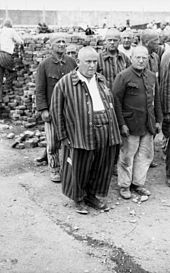
Holocaust: The Germans evacuate 3,000 Jewish slave laborers by train from Warsaw to Dachau. More than 1,000 die during the five-day trip. (THP)
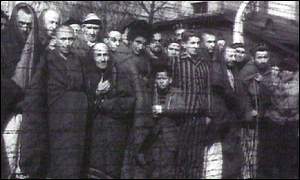
Romani Genocide: In the early morning hours, four thousand Roma are gassed and incinerated at Auschwitz-Birkenau in one mass action, remembered by survivors as Zigeunernacht. By the end of the war, between 70% and 80% of the Romani population has been annihilated by Nazis. Note: No Roma are called to testify at the Nuremberg Trials, and no one came forth to testify on their behalf. No war crimes reparations have been paid to the Roma as a people. (THP)
France: A daring attack by American tank forces cuts off the Germans on the Brittany Peninsula.
Red Army forces form a bridghead across the Vistula at Baranov.
Italy: Florence is evacuated by German forces.
Flying bomb: RAF pilot T. D. Dean becomes the first pilot to destroy a V-1 buzz bomb when he tips the pilot-less craft's wing, sending it off course.
1953 Cold War: Eisenhower warns of "ominous" situation in Asia:

"Speaking before the Governor's Conference in Seattle, President Dwight D. Eisenhower warns that the situation in Asia is becoming 'very ominous for the United States.' In the speech, Eisenhower made specific reference to the need to defend French Indochina from the communists." [For further details, Click here]
1993 War Crimes: Japan formally apologizes for the first time to women forced to serve its soldiers as 'comfort women' (sex slaves) during World War II.
An estimated one hundred thousand to four hundred thousand female sex slaves were forced to deliver sexual services to Japanese soldiers, both before and during World War II. They have been variously called "comfort women," "military sex slaves," "MSS," "military comfort women," and—in Japanese—"jugun ianfu." This program was approved by the Imperial Conference, which was composed of the emperor, representatives from the armed forces and the main cabinet ministers.
Edited by Levi Bookin (Copy editor)
levi.bookin@gmail.com



Click to join 3rdReichStudies



Disclaimer: This site includes diverse and controversial materials—such as excerpts from the writings of racists and anti-Semites—so that its readers can learn the nature and extent of hate and anti-Semitic discourse. It is our sincere belief that only the informed citizen can prevail over the ignorance of Racialist "thought." Far from approving these writings, this site condemns racism in all of its forms and manifestations.
Fair Use Notice: This site may contain copyrighted material the use of which has not always been specifically authorized by the copyright owner. We are making such material available in our efforts to advance understanding of historical, political, human rights, economic, democracy, scientific, environmental, and social justice issues, etc. We believe this constitutes a "fair use" of any such copyrighted material as provided for in section 107 of the US Copyright Law. In accordance with Title 17 U.S.C. Section 107, the material on this site is distributed without profit to those who have expressed a prior interest in receiving the included information for research and educational purposes. If you wish to use copyrighted material from this site for purposes of your own that go beyond 'fair use', you must obtain permission from the copyright owner.
Please Note: The list-owner and moderators of 3rdReichStudies are not responsible for—and do not necessarily approve of—the random ads placed on our pages by our web server. They are, unfortunately, the price one pays for a 'free' website.